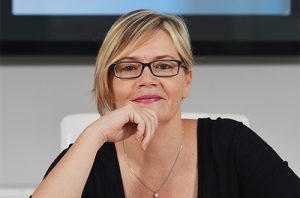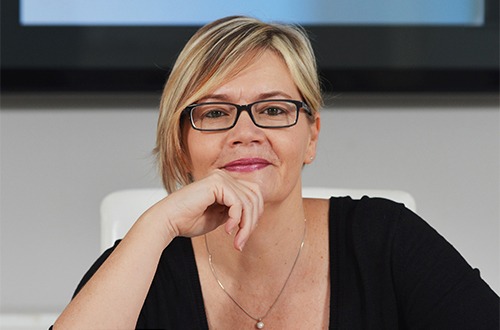
This Women’s Month SME South Africa will celebrate South African women entrepreneurs, pioneers and innovators. Join us as we highlight their successes, sacrifices and struggles. Follow the conversation on Facebook, Twitter and Instagram at #SMEWomenInnovate.
Darlene Menzies is a pioneer in the South African tech space. An innovator and serial entrepreneur, she has often been one of the few women tech-preneurs in any room.
Menzies is the founder and CEO of Finfind, an online aggregator of lenders and funding solution offering access to finance for small businesses, which is backed by the Department of Small Business Development. She is also the brains behind SMEasy, an award-winning accounting and business management platform that she launched in 2014.
Since its launch in 2015, Finfind has gone on to attract hundreds of thousands of users and has facilitated thousands of small business loan leads.
To call Finfind just another fintech company, would underestimate just how good Menzies is at building technology products that make people’s (especially entrepreneurs’) lives better.
Last year, Finfind successfully secured a large investment from Kingson Capital, allowing it to improve the platform’s capability.
Gavin Reardon, founding general partner of Kingson Capital had this to say about the company’s disruptive potential, “We invest in businesses that are disruptive in their industry, have high quality management and possess the ability to scale quickly in South Africa and internationally. Finfind meets all of those criteria and has already proved to be an excellent product market fit. We believe that it bridges a massive gap in assisting SMMEs with access to finance and is well-positioned to have a significant impact on the growth of this vital sector.”
Menzies has also been described as a ‘visionary’. Together with fellow South African tech-preneur Aisha Pandor, co-founder of SweepSouth, and four other African women tech entrepreneurs including Fresh Direct‘s Oluwayimika Angel Adelaja (Nigeria), LifeBank‘s Temie Giwa-Tubosun (Nigeria), Akorion‘s Esther Karwera (Uganda) and Strauss Energy‘s Charity Wanjiku (Kenya), Menzies was selected to participate at the World Economic Forum (WEF) held in Durban in March this year.
According to the WEF, these women have succeeded in areas as diverse as renewable energy, urban farming, fintech, the sharing economy and agricultural tech.
“Like Richard Branson says, build your team and your team will build your business”
A Better Entrepreneurial Environment For All
Entrepreneurial conditions have improved since she first ventured into the IT sector over 20 years ago, says Menzies, in particular the kind of support that is now available for all entrepreneurs.
“It has significantly improved over the last three years – there are more targeted incubation and development programmes available, far more visibility and marketing exposure opportunities, a significant improvement in the engagement and positive reception by corporates for distribution partnerships and most importantly there are more venture capitalists in the ecosystem, thanks primarily to the section 12J investment opportunity.”
What Menzies, and many of the women currently working in the tech space today, will however perhaps be best known for is helping to transform what is still a very male-dominated tech industry.
See also: 13 Inspiring Quotes From Powerful African Women To Kick-start #WomensMonth2017
Menzies speaks to SME South Africa about how tech has the power to change lives and the 3 big decisions that got her to where she is now.
Q: What does being named as one of Africa’s best women technology entrepreneurs mean to you?
Recognition from an international organisation, especially with the pedigree of the World Economic Forum, is a huge honour for myself and our team. The exposure Finfind has already received as a result of the selection has been unprecedented. We are very grateful and excited.
Q: What is your relationship with risk?
I love risk, there is nothing more thrilling. The excitement of risking everything for the big win is a huge driver for me – like with gambling, if you put R10 on the favourite you’re likely to win but the return will be minimal, it’s very predictable (a bit like corporate employment). But if you put R10 000 on an outsider, the chance of winning is greatly reduced, but there is also the opportunity of knocking the lights out. For me, it’s not so much about the money, although money is great, it’s more the thrill/adrenalin rush that risking big as an entrepreneur gives me.
Q: What 3 big decisions you made got you where you are today?
- The courage to risk – firstly to initially leave the comforts and security of my corporate career and then later to start again after my initial failed attempts and liquidations.
- Learning how to choose the right investment partners and more importantly, the right team members.
- Keeping overheads low in the early years – driving an old second hand paid off 1300 Nissan bakkie, being willing to live lean.
“Although money is great, it’s more the thrill and adrenalin rush that risking big as an entrepreneur gives me”
Q: What were some of the biggest lessons you learnt from your first failed business?
When it comes to entrepreneurship, especially innovation, failure is par for the course; if you’re terrified of failing stick with secure employment.
The biggest lesson I’ve learnt from failure in building business is how I view it – I no longer see failure as a negative thing, every failure brought me closer to my success. Personally I’d far rather invest in an entrepreneur who has failed a few times than a passionate, gifted rookie with a clean sheet.
Two key lessons from my failures – the wrong partners will kill your business or emotionally kill you… you have to find the right mix between what they offer as far as financial investment is concerned, plus what doors they can open access to market-wise and importantly, if you are able to work with them/enjoy working with them.
The other expensive lesson I learnt was how to choose the right team. Building a team is key to scaling but it’s also the most difficult, expensive and draining part of growing your business.
A mistake I used to make was trying to help anyone and everyone who needed a job – the quickest way to sink your business is trying to ‘create positions’ for people who need jobs rather than employing the right people for actual gaps in the business.
Nowadays, when it comes to building my team, I focus on my strengths (product innovation, sales, business development) and I employ for my weak areas (operations, technical, support, financial management, HR, etc.).
When it comes to selecting the right people to employ remember that character is as important as aptitude, and especially so when it comes to entry-level positions. In senior posts you can’t compromise on aptitude or character. When it comes to entry level jobs you can train for the skills you need but you can’t teach things like integrity and good work ethic and you can’t easily ‘unteach’ things like entitlement. Another learning from failure is to hire slowly and fire quickly.
Q: What are some of the leadership lessons you have learnt from running a successful enterprise?
Stay close to your customers – ensure that you, your sales and support teams are up to date regarding the challenges and changes of your target market. Create opportunity for sales and support feedback to your product development team to ensure product updates are aligned with market demands.
Don’t lose touch with your team, like Richard Branson says, build your team and your team will build your business. Many entrepreneurs get ‘too busy’ trying to ‘build their businesses’ rather than engaging regularly with their team. As the visionary, it’s good to have regular, short team meetings, share the bigger picture, spend time inspiring your team, it reminds them why they’re working so hard.
Don’t take on too many partners, keep your board and decision-making structures simple, stay agile.
Read, a lot. I’ve never been a typical book reader but I’ve learnt to be intentional about my consumption of digital content both for self-development and to stay in touch with what’s happening in the market. Set Google Alerts or register for relevant blogs, whatever works for you – just make sure you’re reading and growing. Leaders are readers.
Q: How would you describe your leadership style?
Leadership-wise I’m more of an inspirer – the team motivator and vision evangelist – than a good manager. I typically employ people who are passionate about what we are doing and why we are doing it and then lead by stoking this passion through sharing where the business is going and what changes we are making on the ground with the products we are developing. People need a sense of purpose – it fuels effort and makes the hard work worthwhile.
Q: How do you make big decisions?
Ultimately I go with my gut. My dad always taught me to be decisive, if you make a wrong choice you can always re-assess and make a new choice down to change the direction.
After 15 years in corporate IT and 15 years building my own businesses I have learnt to gather and weigh up the facts and importantly to get counsel from people I trust. I then look at my options through the lenses of counsel, common sense, risk, opportunity and danger and then make a clear, decisive call. I always go with the decision that gives me peace – having peace in my heart and feeling settled about my decision, even if it goes against the grain, is paramount to me.
Q: You speak to a lot of entrepreneurs in your work – what encourages you and discourages you about South African entrepreneurs?
I am increasingly encouraged by the change in attitude regarding entrepreneurship – as little as two years ago people were predominantly seeing it as a second choice or fall back option if they couldn’t find secure employment.
These days, people are increasingly recognising the opportunities and benefits of starting their own businesses which is fantastic. What discourages me? Knowing how much more effective big business and government could be in bolstering entrepreneurship efforts and improving the success rate of startups. As such, I try to do my bit to lobby and engage with both to ensure funds are channelled to practical development programmes that make a tangible difference in the lives of every day entrepreneurs.
Q: What do you see as the role of tech in Africa – especially with regards to all the challenges the continent faces?
Tech provides an easy, affordable and highly effective way to both develop and distribute solutions that address the challenges the continent faces.
Mobile solutions are ideal in Africa with the high prevalence of mobile phones. I believe we, as Africans, are ideally placed to provide the best solutions to our challenges as we have firsthand knowledge of the challenges themselves as well as an intimate understanding of the culture and context in which these solutions will be applied – this provides us with a significant advantage over solution architects from the developed world.
There is a growing interest in the burgeoning African market and the opportunities tech solutions offer this large mobile market. The surge of garage-type tech startups in Africa is very encouraging, they are increasingly well-positioned for lucrative investment and partnering opportunities.






